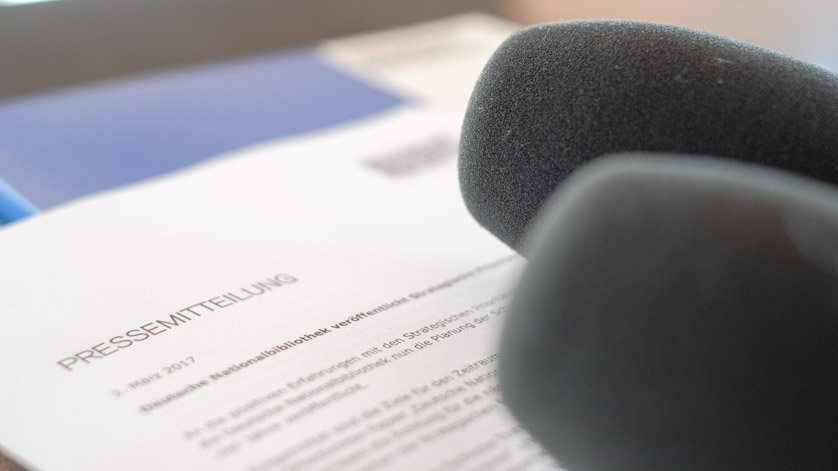Kriegsalltag und Medienwelt: Virtuelle Ausstellung 100 Jahre Erster Weltkrieg

Press release: 3.6.2014
Visitors of the virtual “100 Jahre Erster Weltkrieg” exhibition gain a wide variety of impressions of daily life and of the media during the First World War. The exhibition features more than 200 media objects, including posters and war newspapers, which highlight the importance of mass media in relation to the War. The virtual exhibition is based on and provides an insight into the world war collection of the German National Library which has been reprocessed in preparation for the commemorative year of 2014 and selected items of which have been digitised.
The exhibition is divided into five theme areas examining, for instance, the role of children's and young people's literature in the propaganda machinery of the First World War. Glimpses into daily life during the War in Germany are also offered on the basis of ration cards and the posters hung in towns and cities. A further theme area includes exhibits from war exhibitions which the Deutsche Bücherei presented from 1915 to 1917. The content can be accessed via the different theme areas, but there is also a time line which provides an overview of the sequence of events in the War. There is also a glossary explaining relevant terms.
The First World War, which was subsequently labelled the seminal catastrophe of the 20th century (George F. Kennan), is also regarded as the first media war in human history. In combination with state-coordinated propaganda, the mass media of the time reached into almost every aspect of social life. The librarians of the period recognised and documented the special significance of the media and initiated wide-ranging collections of war writings. These include books, newspapers, posters, official notices, pamphlets, letters, pictures, medals, postcards, photographs, music and films. On 3 October 1914 the Deutsche Bücherei in Leipzig issued notification of the start of a war collection in the “Börsenblatt für den deutschen Buchhandel” and requested assistance in setting up the new collection.
By the time of the final report in 1921 the collection consisted of 35,000 books and brochures, 1,300 war maps, 60 official, law and ordinance gazettes from the previously occupied areas, more than 600 war newspapers, PoW and military hospital newspapers, “Heimatgruß” circulars from local communities, associations, student societies and companies. Added to these were 15,000 posters, 150 aerial propaganda leaflets and 40 capsules containing prints.
Background
The Deutsche Bücherei was founded in Leipzig on 3 October 1912. Following the partition of Germany, the Deutsche Bibliothek was set up together with the German Exile Archive 1933 - 1945 in Frankfurt am Main. The Deutsche Bibliothek also housed the German Music Archive from 1970; this moved to Leipzig at the end of 2010. The German Museum of Books and Writing became part of the Deutsche Bücherei in 1950. The libraries were then amalgamated following the reunification of Germany.
Since 2006 the unified institution has been known as the German National Library (Deutsche Nationalbibliothek). It collects, documents and archives Germany's published scientific and cultural and scientific heritage in text, image and music form for use in the present and the future. The items collected include media publications issued on paper, on microforms and on other data carriers. They also include sound recordings and online publications. Besides offering use of its collections at the Leipzig and Frankfurt sites, the German National Library also provides services for libraries, the book trade, scientific institutions and individual users.
The aims of the “First World War Collection” project are to bring together all the collected First World War media publications in a virtual environment and to improve their thematic retrieval in the portal catalogue. In doing so the German National Library grants direct access to its resources.
Virtual exhibition
Kriegsalltag und Medienwelt: Virtuelle Ausstellung 100 Jahre Erster Weltkrieg
Contact person
s.jacobs@dnb.de
Contact: s.jockel@dnb.de

